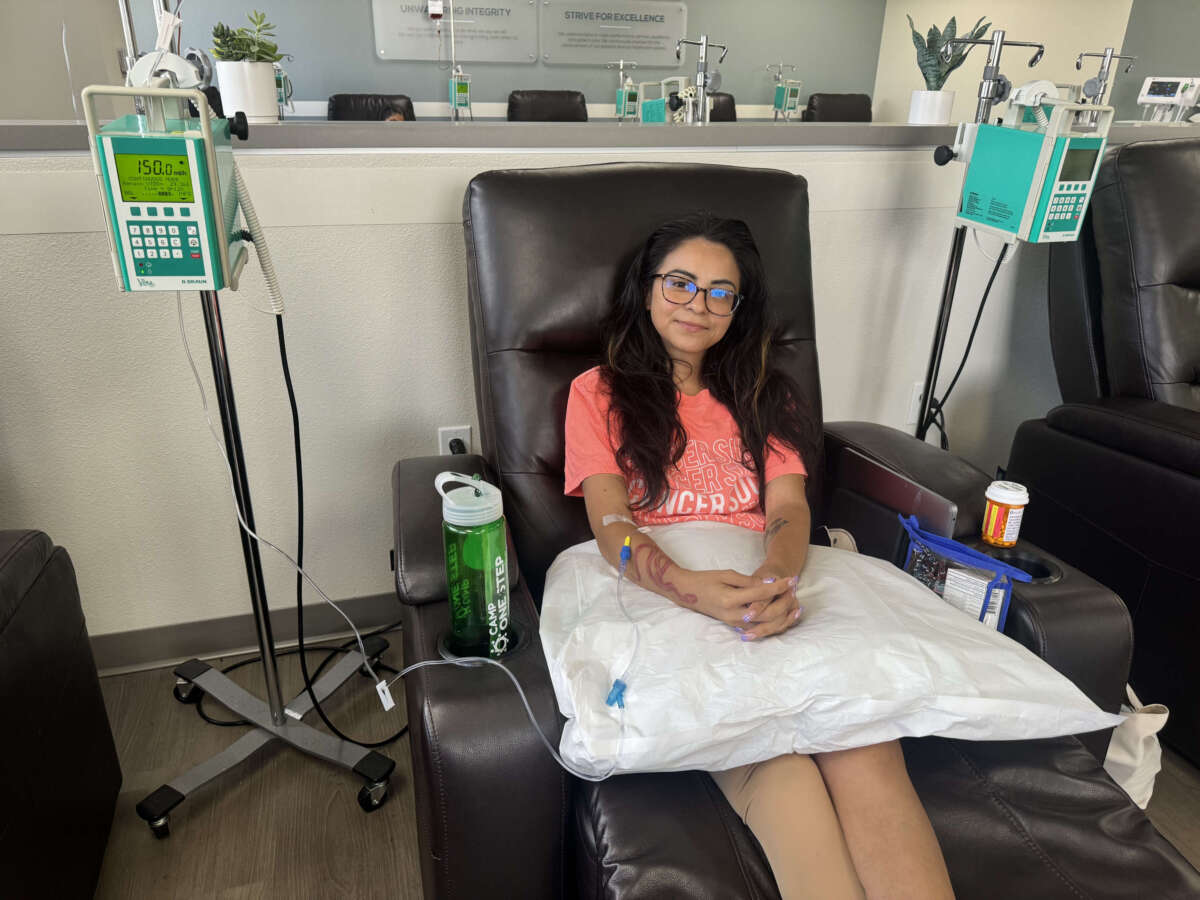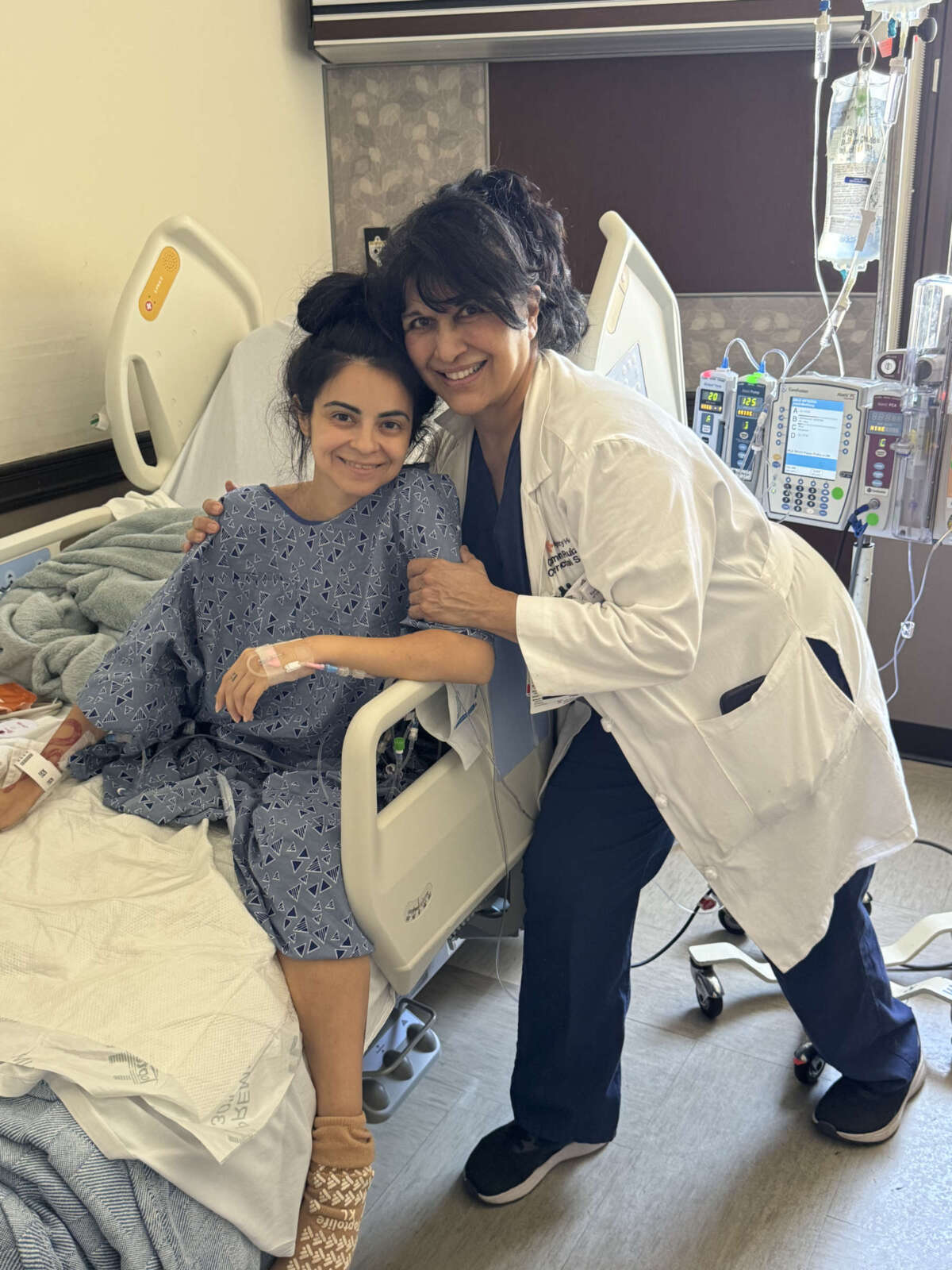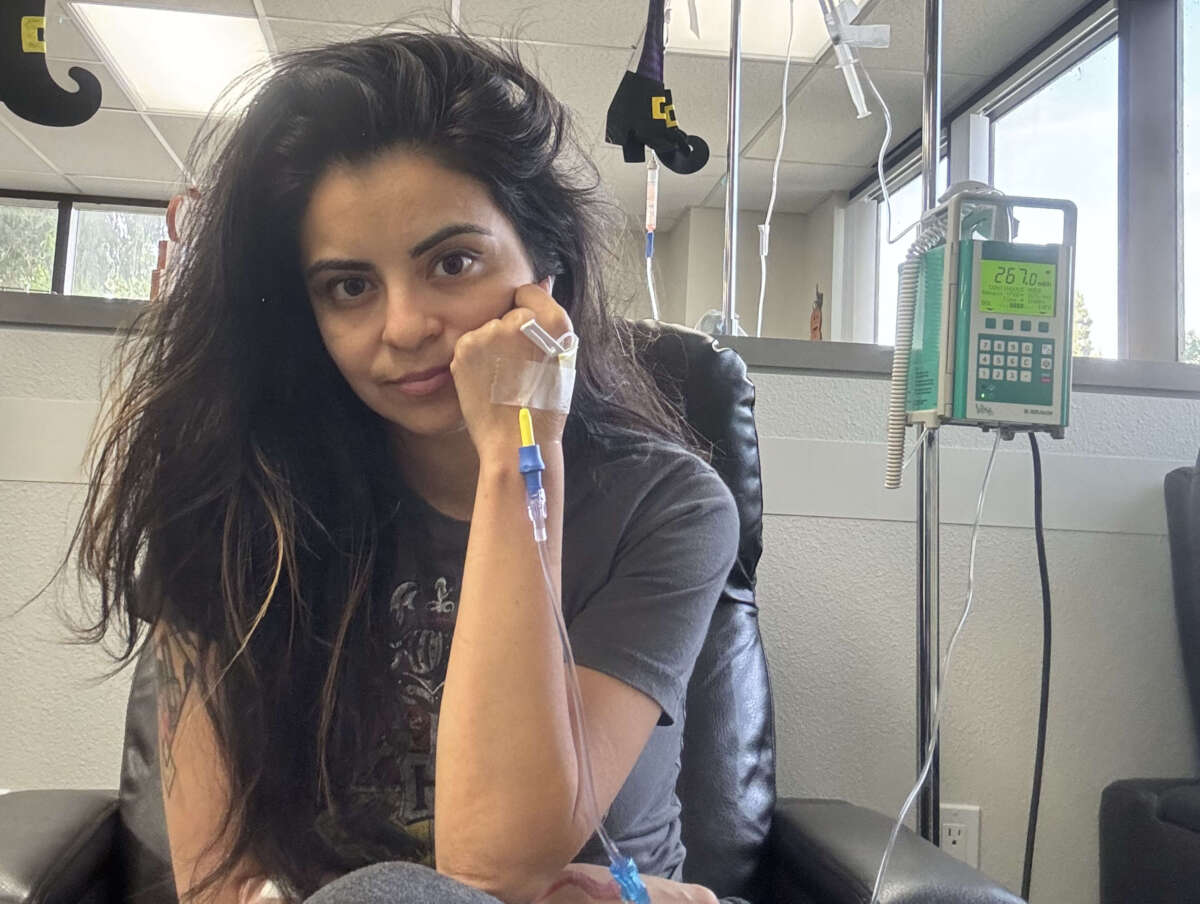Part of the Series
Fighting for Our Lives: The Movement for Medicare for All
My gastroenterologist gulped as he read the results of my colonoscopy. The images confirmed what I had already been told: A malignant tumor was blocking nearly the entire pathway of my colon.
I could sense his guilt. After all, he had initially placed me on a two-month waiting list for the procedure — on top of the three months it had taken just to get an appointment with his office.
He spoke carefully, choosing his words with the precision of someone trying to avoid legal fallout. He explained, in the gentlest terms, why he had initially misdiagnosed my symptoms as a possible autoimmune disorder. But by then, I wasn’t angry — I was devastated. Fear and disappointment had long since replaced any sense of outrage. The harsh reality was clear: The U.S. health care system had failed me at nearly every turn.
Since the onset of my symptoms in October 2023, I faced one obstacle after another. My insurance took weeks to authorize urgent referrals, after which I had to wait months for a specialist of their choosing. All the while, my body deteriorated. Diarrhea, bloating, increased gas, irregular stools and constant digestive discomfort became my everyday reality, while I was forced to wait — wait for appointments, wait for diagnoses, wait for someone to take me seriously. Between April 2023 and my diagnosis in June 2023, I lost a whopping 30 pounds, nearly a third of my original weight.
It wasn’t just the colorectal cancer that was killing me — it was the crushing inefficiency, delays and gaps in care that allowed my condition to worsen unchecked. What should have been a straightforward diagnosis and treatment plan became an endless series of frustrations and missed opportunities, with my life hanging in the balance.
Shared frustrations of this sort have manifested in growing anger across the country, particularly in the wake of the shooting of UnitedHealthcare CEO Brian Thompson. While some have expressed support for the alleged suspect, Luigi Mangione, this tragedy underscores a much larger discontent with a health care system that has left millions of Americans feeling helpless and unheard.
It wasn’t just the colorectal cancer that was killing me — it was the crushing inefficiency, delays and gaps in care that allowed my condition to worsen unchecked.
It’s not just about one individual; it’s about an entire system that has failed countless people like me, pushing them to desperate measures. The widespread grief and rage are a testament to how deeply the roots of this crisis run, and how many have suffered in silence, waiting for change that never comes.
An Alarming Shift in Cancer Demographics
In recent years, a concerning trend has emerged: Young people, particularly those under 55, are being diagnosed with cancers once considered predominantly diseases of older adults. From lung and colorectal cancers to breast and thyroid cancers, malignancies traditionally associated with aging are now showing up in younger populations with alarming frequency. Alongside this troubling increase in diagnoses is a parallel crisis: delays in treatment and care due to issues of health care access, insurance coverage and systemic barriers to timely interventions.
Between 1990 and 2019, new cancer cases among younger adults increased by nearly 79 percent worldwide, according to a study published in BMJ Oncology.
In discussing key risk factors driving this alarming rise, the study’s authors pointed to dietary factors, alcohol consumption and tobacco use as the primary contributors to the most common early-onset cancers in 2019. Current tobacco use among U.S. middle and young adults, however, has dropped to its lowest recorded level in 25 years. Research suggests that a wide variety of variables — ranging from environmental factors, including chemical exposure and air and water pollution, to genetic predispositions — are playing an increasingly significant role in the surge of cancer diagnoses among younger adults. These factors, coupled with changes in lifestyle and exposures, could help explain the troubling trend of rising cancer rates in a group once thought to be less vulnerable.
The study also notes a significant uptick in cancer rates, particularly among women and people in their 30s. While cancer remains more common in older adults, the rising numbers in younger populations have raised alarm among health experts, who are grappling with the underlying causes and implications for early detection and treatment.
Researchers are continuing to explore the factors contributing to this trend, including lifestyle changes, environmental exposures and genetic factors.
“I had trained medical doctors tell me, ‘You’re too young to be sick.’”
The increasing burden of cancer in younger adults has already prompted calls for more targeted screening and prevention strategies in this at-risk group. Despite a nearly 50 percent rise in colorectal cancer rates among people under 55 since the 1990s, I faced a nine-month delay in receiving treatment. Being 35, my age didn’t raise enough red flags for doctors to suspect colorectal cancer — especially since the median age of diagnosis is 70 for men and 72 for women, according to the National Institutes of Health.
Even more concerning, my own history with childhood cancer — over 25 years ago — was dismissed by medical professionals as being irrelevant to my symptoms. At one point, I was even told that it was “unlikely” I would develop cancer again so long after remission. The assumption that younger patients are less likely to be at risk for serious conditions like colorectal cancer continues to contribute to dangerous delays from both medical providers and health insurance companies.
Experiences like mine are far from unique. Take A. Baroff, for example, who had to wait two years to undergo surgery for thyroid cancer. Despite her background in medical research, she faced persistent skepticism from health care professionals throughout her ordeal. Her initial symptoms — eye problems, neuropathy, and difficulty breathing and swallowing — were dismissed as “hypochondria” by doctors, delaying her diagnosis and treatment. Unfortunately, stories like Baroff’s highlight the frustrating and often dangerous delays that many cancer patients experience before they finally get the care they need.
“I had trained medical doctors tell me, ‘You’re too young to be sick’,” said Baroff, “and it felt so disheartening that no matter what I said about my own body, I was treated as though I was not right or making up symptoms.” The day she was finally diagnosed, she checked herself into the emergency room, where doctors initially told her swollen lymph nodes were simply a result of a cold. Refusing to leave without answers, she insisted on an ultrasound, and her self-advocacy paid off. That was in January 2020 — just before the world shut down due to the COVID-19 pandemic.
In the weeks following her diagnosis, Baroff faced another setback: her insurance company dropped her coverage. Having recently returned to California after living in Boston for medical school, she was now confronted with the harsh reality of the state’s overwhelmed health care system. As a result, her thyroid cancer went untreated for more than two years, delayed further by strict hospital lockdowns during the early days of the pandemic. Moving home to be closer to family had unintended consequences, postponing her treatment at a critical time.
During the COVID-19 pandemic, many patients, including Baroff, were told they would need to wait for essential medical procedures as hospitals prioritized more “high-risk” cases. This disruption, compounded by insurance issues and inefficiencies in the health care system, brought into sharp focus the struggles faced by younger people confronting chronic illness for the first time in their lives. For many, the pandemic underscored the vulnerability of a medical system ill-equipped to address their needs in a time of crisis.
The growing cancer crisis among young adults has reignited discussions around systemic health care reform, particularly the push for Medicare for All.
“I was completely in survival mode,” said Baroff of navigating cancer while quarantined. Although she continued to try and reach out to medical experts in her area for second opinions and treatment options, many hospitals were at capacity. “I was pretty isolated and anxious. I think it was just a lot of fear and worry during that time, on top of experiencing [cancer] symptoms.”
In a last-ditch effort, Baroff reached out to a former colleague from her time at Harvard Medical School, who connected her with a specialist at Massachusetts General Hospital. In March 2022, she was finally able to schedule surgery in Boston to remove the tumor. Yet her experience serves as a stark reminder of the systemic issues within health care, particularly for young patients, and underscores the critical need for greater empathy and urgency in medical care.

Prescreening: A Barrier to Early Detection and Timely Treatment
For many young people who are diagnosed with cancer, the journey from detection to treatment is far from straightforward. While prescreening programs for older adults are relatively well-established, younger populations often fall through the cracks in the health care system. Screening guidelines for many types of cancer do not typically recommend early checks for those under 50, leaving younger adults without an easy path to early diagnosis.
Rhonda Bulwer was 36 when she first discovered a lump in her right breast. In July 2023, she requested a mammogram, but her age — below the typical threshold for routine screening — delayed the process by a month, despite her family’s history of breast cancer. After undergoing a mammogram, ultrasound and biopsy, Bulwer was diagnosed with HER2-positive breast cancer in October 2023.
Bulwer chose to participate in a clinical trial, an option recommended by her doctor. However, her insurance company initially denied approval for the experimental treatment due to delays by her health care provider, who did not reach out to Cedars-Sinai Medical Center until just days before the trial was set to begin. This was partly due to holiday scheduling when many medical offices were closed and staff, who already experienced burnout, failed to initiate timely communication.
“I pleaded with insurance for them to appeal,” said Bulwer, “but the time the approval came through, the clinical trial denied me because they wanted to start in early January and I had already missed the deadline.”
True health care justice can only be achieved when all people, regardless of income or background, have access to the care they need without financial or bureaucratic barriers.
When the clinical trial fell through, Bulwer turned to standard treatments — immunotherapy and surgery — delaying her care by another month. She also encountered obstacles in advocating for her needs with her surgeon. To undergo a double mastectomy, she needed approval from both her doctor and her insurance company. While the insurance company agreed to cover the procedure, her doctor hesitated, deeming the surgery on both breasts unnecessary, despite Bulwer’s family history — her grandmother had died from breast cancer-related complications.
Eventually, Bulwer secured approval from her medical team for the surgery, and her insurance agreed to cover most of the cost. She is now recovering and will undergo two more rounds of immunotherapy.
A Call to Address the Health Care Gaps
As we confront this public health crisis, the question remains: What needs to be done to ensure that young adults are given the tools they need to fight — and survive — cancer?

The rise in cancer diagnoses among young people calls for a radical reevaluation of health care policies. First and foremost, there needs to be a national conversation about expanding and standardizing prescreening programs for younger adults. Many medical organizations, including the American Cancer Society, are already advocating for earlier screening for colorectal cancer, for instance, with recommendations suggesting that individuals with no family history of cancer should begin regular screenings at age 45, rather than 50.
Compounding this issue is the reality of health care access. Many young adults are navigating a health care landscape that is dominated by private insurance, which can be prohibitively expensive, particularly for those in low-wage or gig economy jobs without employer-sponsored plans. High deductibles, copayments and gaps in coverage often prevent people from seeking timely care, and insurance companies may delay or deny life-saving treatments in favor of lower-cost alternatives.
In the United States, health care coverage disparities have long been a source of systemic inequality. The Affordable Care Act (ACA) did expand coverage for many young people, but that coverage may be at risk. If Republicans allow the enhanced ACA subsidies to expire at the end of 2025, millions of Americans who rely on financial assistance to buy health coverage could lose their insurance.
I often reflect on the conversations I’ve had with fellow cancer patients like Baroff and Bulwer, who share similar stories of gaslighting and dehumanization within medical institutions that are supposed to save our lives. During our interview, Baroff said something that deeply resonated: “When people are at their most vulnerable, they’re not going to be their best selves.” This is why we rely so heavily on the expertise and empathy of doctors and medical practitioners to guide us through such a deeply traumatic journey.
Ultimately, that journey is impossible without systemic reform at every level — from the hospitals where we receive care to the pre-screenings that insurance companies often block.
The growing cancer crisis among young adults has reignited discussions around systemic health care reform, particularly the push for Medicare for All. As cancer diagnoses in younger populations rise, especially those under 45, advocates of universal health care have been vocal in connecting the dots between access to timely, life-saving care and the broader failures of the current health care system.
Medicare for All advocates have argued that comprehensive, universal coverage is necessary to address not just the immediate needs of patients but also the structural inequities that exacerbate health disparities — such as the burden of high insurance premiums, rising co-pays, and the troubling trend of insurance companies denying or delaying coverage for necessary treatments or pre-screenings. The current cancer crisis among young adults has brought this conversation to the forefront, drawing attention to how the health care system often fails to protect the most vulnerable, and underscoring the necessity of a more equitable, efficient model like Medicare for All.
Though the Medicare for All movement has been active for years, often under the radar, the urgency of the current moment has brought it into sharper focus.
Researchers and medical advocates have used the surge in cancer diagnoses to make a compelling case for the need to overhaul a health care system that routinely privileges profit over patients’ well-being. The push for systemic reform has highlighted how structural barriers — from high deductibles and restricted access to preventative screenings to the increasingly monopolized hospital systems — contribute to late-stage cancer diagnoses and worsened survival rates. Their calls for policy change underscore that true health care justice can only be achieved when all people, regardless of income or background, have access to the care they need without financial or bureaucratic barriers.
To make a meaningful difference, we need not only comprehensive health care reform but also a cultural shift in how cancer is understood and treated in younger patients. Without these changes, countless lives will continue to be lost to a disease that could have been detected and treated much earlier.
Media that fights fascism
Truthout is funded almost entirely by readers — that’s why we can speak truth to power and cut against the mainstream narrative. But independent journalists at Truthout face mounting political repression under Trump.
We rely on your support to survive McCarthyist censorship. Please make a tax-deductible one-time or monthly donation.
